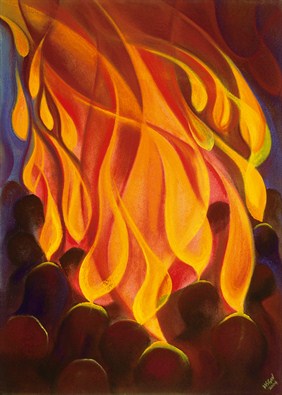
.
.The
“Breath” of God and Gifts of the Spirit.
The Spirit of
God works in us so that we can be a people after God’s own heart
.
by Steve Clark
The “Breath”
of God
We tend to think of the Spirit as
being immaterial (a true statement) and therefore weaker, less substantial
(a false one). Psalm 33:6-9 makes it clear that something spiritual is
something powerful, something “charged with” the Spirit, who is the power
of God:
By the word of the LORD
the heavens were made, and all their host by the breath of his mouth. He
gathered the waters of the sea as in a bottle; he put the deeps in storehouses.
Let all the earth fear the LORD,
let all the inhabitants of the world stand in awe of him! For he spoke,
and it came to be; he commanded, and it stood forth.
The word Spirit is a translation of
a Hebrew (and Greek) word that sometimes is translated “breath,” as in
the above psalm, and at other times, “wind.” The Holy Spirit, then, is
“the breath
of his [God’s] mouth.”
There is an image behind the use
of word and spirit as synonyms in this psalm. We can only
speak a word when we breathe out. To speak, we breathe and form our breath
into a sound of a certain sort. A word then comes into existence. The breath
(spirit) gives the force or energy for the word to be spoken and heard.
If you project your voice or shout, you realize this more quickly, because
doing so takes more breath.
The word of God creates heaven and
earth. Speaking of “the heavens ... and all their host ...” as well as
“the earth ... and all the inhabitants of the world,” the psalm says, “He
spoke, and it came to be; he commanded, and it stood forth.” In other words,
by speaking a command, God created everything. His command contained the
understanding of what he wanted to happen, which came from his wisdom or
reason. His breath or spirit contained the force or power that brought
it into existence. The Spirit with which he breathes his word is creative
power itself.
Although seemingly insubstantial,
wind can be very powerful. We can see something of this by considering
a hurricane or tornado, both very strong winds. I was once staying with
my mother when she lived close to Miami on Biscayne Boulevard. One evening
a tornado decided to go north on Biscayne Boulevard. It touched down at
three points and then headed out to sea. The next morning I went to one
of the spots where it had landed and was impressed with how little it left
of what once was a substantial building. The Scripture tells us that this
is the kind of power that the “breath of God” has.
On the other hand, wind can have
constructive effects. It can blow on a windmill and produce electricity
or power a water pump. It can fill sails and move a boat across a great
ocean. To get such results, we need the ability to receive the wind and
apply its power to something useful.
Sometimes we use the phrase “charged
with the Spirit.” Behind this is the image of an electrical wire. We can
plug a cord into an appliance and nothing will happen. When, however, the
other end of the cord is plugged into a socket, the cord is charged with
electricity and brings electrical power into the appliance to enable it
to function. Something charged with the Spirit is spiritually powerful
and capable of getting spiritual results.
Spirit, then, is something forceful
or powerful. The Holy Spirit, the holy breath of God or wind from God,
brings with him God’s power. He enables what he enters into to operate
with spiritual or divine power. That is why Jesus said in Acts 1:8, “But
you shall receive power when the Holy Spirit has come upon you,” and why
Peter said in Acts 10:38, “God anointed Jesus of Nazareth with the Holy
Spirit and with power.”
The Holy Spirit, however, is not
naked power or brute force. He brings power accompanied by and formed by
wisdom, because he is the power of God. As a consequence, he not only seeks
to make our action more powerful, he also seeks to direct our action so
that we know better what to do and how to do it. When the apostles wanted
to choose what are sometimes described as the first deacons (servants),
Peter said to the community, “Therefore, brethren, pick out from among
you seven men of good repute, full of the Spirit and of wisdom [or full
of the Spirit of wisdom, the wisdom-bringing Spirit], whom we may appoint
to this duty” (Acts 6:3). They were to look for men to whom the Holy Spirit
had given wisdom, spiritually wise men. It is the combination of wisdom
and power that forms human action and makes it effective and not chaotic
or destructive, like that of an enraged man out of control. When we receive
the Holy Spirit, then, he enters into us with wisdom and power, to equip
us and work through us so that we can serve the kingdom of God in a more
effective way.

Gifts
are the result of the Holy Spirit working in us
Scripture speaks about gifts and
graces that come from God, to use the traditional English translations.
The two words seem to be rough synonyms, although some teachers distinguish
between them. They are used to speak about what God does inside of us when
he takes us into relationship with himself and fills us with his Spirit.
They are called gifts or graces (favors), because they are not something
we can earn or acquire by our own efforts, like the skill attested by a
medical degree, but are the result of the Holy Spirit working in us “as
he wills.”
On the other hand, gifts and graces
of the Holy Spirit are not like modern birthday gifts but are more like
birthday gifts used to be. I remember that when I was a child, I received
toys or something similar from most people, but I could always count on
my aunt, who was a somewhat old-fashioned person, to provide me with some
clothing or something else “useful.” My parents seemed happier with her
gift than I was.
God’s gifts, at least for the most
part, are not given to us to enjoy or use for whatever we want. I once
visited a park that had belonged to a duke in England. They showed us where
“the lion” had been kept, a place surrounded by a strong fence. Some tribal
chief in Africa had apparently sent the duke a lion as a gift. The gift,
however, had a mind of its own, so there were only a very limited number
of things the duke could do with him. God’s gifts are more like having
a lion than having a gift certificate — they have “a mind of their own,”
so to speak. We can only make use of them if we cooperate with the way
they function.
The word gifts can also be misleading
in another way. When we think of a gift, we think of something we can take
and carry off and still make use of when the giver is gone. But the gifts
of the Spirit, especially the charismatic gifts or spiritual gifts, do
not function apart from the giver himself. They are ways to receive the
action of the Spirit working in and through us to accomplish some purpose
that we can only serve.
Manifestations
of the Spirit
On the other hand, a gift of the
Spirit is not exactly the same thing as a particular action of the Spirit
or a working of the Spirit. In 1 Corinthians 12 Paul discussed “spiritual
things”(a phrase the RSV translates as “spiritual gifts”) like the gifts
of tongues, prophecy, healing, and miracles, which he described as “manifestations
of the Spirit” (verse 7). He discussed them in order to put them into a
context that would allow the Corinthians to understand how to respond to
them well.
In verses 4-6 he began to speak directly
of these gifts: “Now there are varieties of gifts, but the same Spirit;
and there are varieties of service, but the same Lord; and there are varieties
of working, but it is the same God who inspires them all in every one.”
Paul here uses three terms: gifts, services, and workings. The last word
is difficult to translate but is sometimes rendered “operation” or “inspiration.”
It is used to describe the fact that God at times works through us (operates
through us) to get something to happen.
These three words all refer to the
same set of things, but they have three somewhat different meanings. When
people are “healers,” God works through them to heal, and so the healing
that occurs is a work of God. At the same time, by praying for people,
healers are performing a service. But also they have been given a gift
that enables them to receive the workings of God that allow them to perform
their service.
Having a “gift” can be distinguished
from experiencing or cooperating with a “working,” as being a prophet or
having the gift to be a prophet can be distinguished from giving a prophecy.
The working is God’s action, God’s doing something through us. The gift
is God’s having enabled us to receive his working on a regular basis. God
seems willing to work through a great variety of people to heal at different
times. But if we speak of someone as having the gift of healing, we mean
more than that. We mean that that person can somehow tap into the working
of God in a regular way and so can get more regular results than someone
who just prays over another person and sees a healing.
We can, then, see the gifts and graces
of the Spirit as equipping us or “programming” us, making us “spiritual
receptors.” To use an analogy, the internet can send music. But if we do
not have an application or program on our computer that is capable of receiving
what is sent, we will never hear that music. When the Holy Spirit gives
us gifts, he does something like program us—that is, change us spiritually
inside—so that we can receive what he does, his “workings,” in an ongoing
way.

The Gift
of the Spirit Himself
The first kind of gift that we receive
is one that we have already discussed, the gift of the Spirit himself.
This is the chief gift we are given. When we have received the gift of
the Spirit, we have
God himself abiding in us, giving
us life and working in and through us.
As we have seen, the gift of the
Spirit brings us new life, and as a result of that life, the fruits of
the Spirit should grow. To be sure, life needs feeding and this fruit comes
through exercise
or practice. Some people who have
received the Spirit or been baptized in the Spirit do not seem to have
received much spiritual life or to have become very spiritualized. Nonetheless,
spiritual life and the fruit of the Spirit become possible, in principle,
through the gift of the Spirit.
The life-giving presence of the Holy
Spirit in us makes it possible for us to be effective. If we were not alive,
we could not do anything. Therefore, without the spiritual life the Holy
Spirit gives, we cannot do anything or have any effect as Christians. However,
considering the gift of new life in the Spirit and the way he works to
enable us to develop greater likeness to God in our character does not
cover all his gifts. He also gives us gifts that equip us to be effective
in serving him or in acting to advance his kingdom, and those are the focus
of this chapter. Here we do not need to do any more than call to mind the
basic gift of the Spirit so that we can see the overview.
 Gifts and
Graces for All
Gifts and
Graces for All
Some gifts of the Spirit seem to
be for everyone, the kind of spiritual equipment that comes with being
a Christian. The prophecy in Isaiah 11:1-5 has been traditionally understood
to be a description of such gifts:
There shall come forth
a shoot from the stump of Jesse,
and a branch shall grow out of
his roots.
And the Spirit of the LORD
shall rest upon him,
the spirit of wisdom and understanding,
the spirit of counsel and might,
the spirit of knowledge and the
fear of the LORD
And his delight shall be in the
fear of the LORD.
He shall not judge by what his
eyes see,
or decide by what his ears hear;
but with righteousness he shall
judge the poor,
and decide with equity for the
meek of the earth;
and he shall smite the earth
with the rod of his mouth,
and with the breath of his lips
he shall slay the wicked.
Righteousness shall be the girdle
of his waist,
and faithfulness the girdle of
his loins.
This is a prophecy about the coming
Messiah, delivered toward the end of the eighth century B.C. The royal
house of Judah, the house of David, here referred to by mentioning Jesse,
the father of David, is like a large tree that has been cut down. Only
the stump remains. But a new shoot or branch will grow out of it. That
shoot will be the Messiah, that is, an anointed king. In other words, at
a time when it will look as if there are no kings left, a new king will
arise.
According to the prophecy, this promised
Messiah will have the Holy Spirit rest on him—that is, come into him in
an abiding way in order to equip him to be an effective king. The same
thing, in other words, will happen to this descendant of David that was
described in 1 Samuel 16:13 as happening to David himself: “Then Samuel
took the horn of oil, and anointed him in the midst of his brothers; and
the Spirit of the Lord came mightily upon David from that day forward.”
In other words, David was anointed
by Samuel to be the king, and then the Spirit of the Lord came upon him
in a powerful way to equip him to be king. The Spirit needed to remain
with him and work through him in an ongoing way, because he was to be king
for over forty years, all day long and all year long. David did not receive
a particular working (inspiration) or help when he was anointed but a spiritual
equipping that lasted “from that day forward.”
According to the prophecy, the Holy
Spirit would provide different kinds of spiritual equipment for this king
and, as we shall see, for us. There are some different interpretations
of the set of words that describe this equipment, but the following is
a helpful one:
Wisdom
and understanding
These correspond to what we might
call mental formation, the mental formation that allows us to know basic
truths like the nature of God, the creation of the world, and basic morality—that
is, what is right and wrong. A king who has these gifts should be able
to understand what he is about in the light of an overall grasp of the
world and its relationship to God, of human life and how it can arrive
at what God created it to be. The Spirit of God works in us to teach us,
to so form our minds that we can understand foundational truths in a spiritualized
way.
Counsel
and might
These are equipment for action.
Counsel is good judgment about what to do as different situations present
themselves to us. Might is the strength to do what we need to do, especially
the ability to handle difficulties or obstacles that might turn us away
from doing what we judge is the right thing to do. The Spirit of God works
in us to make us effective servants (agents) of his.
Knowledge
and fear of the Lord
These concern our relationship with
God. Knowledge in this context probably refers to the personal experiential
knowledge of God and what he wants of us. It is “knowing him and not just
knowing about him.” Fear of the Lord is obedience to him. The Spirit of
God works in us so that we can be in a good relationship with God.
His delight
is the fear of the Lord:
His delight is the fear of the Lord
seems to be a concluding summary statement. A godly king should be someone
who delights to do what God wants, whose inner orientation is to do what
God wants in everything. David was described as a “man after [God’s] own
heart” (1 Samuel 13:14), not meaning that God had affection for him but
that David wanted what God wanted. The Spirit of God works in us so that
we can be a people after God’s own heart.
Irenaeus, a second-century father, described the Spirit in his book
Against
the Heretics (III, 17) as “the
Holy Spirit, who descended upon the Lord, the spirit of wisdom and understanding,
the spirit of counsel and fortitude, the spirit of knowledge and piety,
the spirit of the fear of the Lord, and to whom he in turn gave to
the Church, sending the Paraclete from heaven unto all the earth.”
Irenaeus saw the seven “gifts” as seven ways in which the Holy Spirit himself
operates in us. The prophecy in Isaiah 11, then, was fulfilled when the
Holy Spirit descended upon the Lord to equip him to save us and to bring
the kingdom of God to the human race (see also Luke 4:16-21). But it was
also poured out on him for us, so that when we are baptized and baptized
with the Holy Spirit, we too are equipped as he was.
God, then, gives certain gifts to
all of us. He allows us to participate in the gifts that Christ, the Messiah,
was given so that he could advance the kingdom of God in the face of spiritual
opposition. We all therefore have been equipped with gifts that allow us
to receive and grow in spiritual wisdom and understanding, so we can understand
basic truths about reality and morality; counsel and might, so we can act
more effectively; and knowledge and fear of the Lord, so we can be in a
good relationship with the Lord. We can be a people whose delight is in
the fear of the Lord, so that we live as his servants, to advance his will
and his kingdom. If we have confidence that God has done these things in
us, we will be able to advance his kingdom more effectively.
This
article is adapted from the book Charismatic
Spirituality: The Work of the Holy Spirit in Scripture and Practice,
copyright © 2004 by Stephen B. Clark and published by Servant
Books, a division of Saint Anthony Messenger Press. Used with permission. |